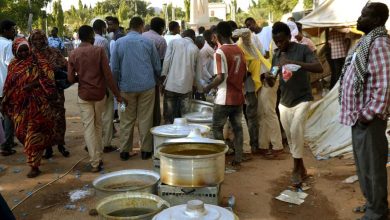Curbing Inflation…Data Defeats Goals

Report – Rehab Abdullah
The expectations of many observers on bringing down inflation and implementing a monetary policy have been challenged by economic experts who weighed the data available and the war conditions. The experts arrived at different conclusions.
They argued that the war has not stopped and the wheel of economic activities have not yet moved. They also believed that without the realization of a number of economic conditions the expectations would evaporate soon.
Some have even doubted that the possibility of preparing a budget or monetary policy in light of the current circumstances. However, the Ministry of Finance surprised them by preparing an emergency budget, it described as the war budget, although its details have not been announced yet.
In the meantime, the Central Bank of Sudan has announced its monetary policy, which aims to reduce inflation rates to two digits by the end of the year 2024, within the range of 155% on average during the year 2024, but despite what has been achieved, numerous hurdles stand as barricades that may prevent achieving what the monetary policy or war budget aspires to.
Dreams and hopes
The former Secretary-General of the Tax Office, an expert in financial management, Ahmed Adam Salem, ruled out achieving the two-digit inflation figure observed in the monetary policy of the Central Bank of Sudan in 2024, and asked in a statement to Sudan Events “How can inflation be reduced when the war is still going on and depleting all resources?” He stressed that any reading of economic indicators in the current circumstances does not produce sound results.
He argued that it was impossible to reduce inflation to two digits while all production components have collapsed, and there is no production at all, and there is no export, therefore there are no revenues and no cash reserves. He further went to add that the whole matter was merely day dreaming and aspirations that cannot be fulfilled.
Impossibility
Economist Dr. Muhammad Al-Nayer goes in the same direction and stated that it will be difficult to achieve the inflation rate targeted by monetary policy to be a double figure or an average of 155% by the end of the year 2024. He told Sudan Events that according to current data, the inflation rate has increased significantly. A significant increase during the last period due to the war and people’s exploitation of the conditions of war, whether in transportation costs, renting homes, or the prices of goods and services, etc., as they rose in an unprecedented manner, and therefore Nayer believes that the 2024 budget was supposed to be set in a realistic and effective way and an inflation rate that is basically achievable in accordance with the given available data.
He stressed that the indicators mentioned are very difficult to achieve according to the current data, especially since the state’s revenues were affected in the year 2023. Al-Nair goes on to indicate that it was assumed that realistic revenues would be prepared and that this would increase the size of the deficit in the state’s budget, and this must be taken into account in the next stage.
When will the rate be achieved
The Dean of the Faculty of Economics at the University of Sudan, Dr. Abdel-Azim Al-Mahal, points out to the possibility of achieving the targeted inflation rate in a number of cases, when achieving the inflation rate in the year 2024 depends largely on the end of the war, the donors fulfilling their pledges, and the creditors fulfilling the debt forgiveness next June, and he confirmed an interview with Sudan Events that in this case inflation can be reduced to a double digit, adding that achieving the target rate also depends on the return of the Sudanese citizens in general with a new understanding and when they disavow the past stereotyping that was prevalent and change towards embracing production, responsibility, dedication and sincerity while rejecting fragmentation and division.
He argued that reaching the aspired inflation rate depends on the establishment of security, a strong security grip, and staying away from chaos, in addition to the desired political stability and an agile, professional government.
“Japan has only 17 ministers, and we have more than 1,500 constitutional posts.” He added.
Al-Mahal stressed that the implementation of monetary policy requires the presence of a sufficient reserve of hard currencies, especially the dollar, and that the central bank enters as a seller or buyer depending on the circumstances, but if the situation continues as it was before the revolution, the inflation rate and the price of the dollar are determined by black-markets traders in local markets in Khartoum.
He believed that under the current circumstances “It is very difficult for the central bank to implement its monetary policy…it is equally difficult for the Ministry of Finance to implement its financial policies.”



